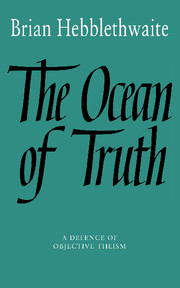Book contents
- Frontmatter
- Contents
- Preface
- 1 Christian belief in God
- 2 The ebbing of theistic faith
- 3 The interiorisation of faith
- 4 Theism in the modern world
- 5 The significance of Kant
- 6 The grounds of theistic belief
- 7 The question of truth
- 8 Religions – theistic and non-theistic
- 9 Life after death
- 10 The Christian Church and objective theism
- Appendix: The Church's ministry
- Notes
- Select bibliography
- Index
9 - Life after death
Published online by Cambridge University Press: 06 July 2010
- Frontmatter
- Contents
- Preface
- 1 Christian belief in God
- 2 The ebbing of theistic faith
- 3 The interiorisation of faith
- 4 Theism in the modern world
- 5 The significance of Kant
- 6 The grounds of theistic belief
- 7 The question of truth
- 8 Religions – theistic and non-theistic
- 9 Life after death
- 10 The Christian Church and objective theism
- Appendix: The Church's ministry
- Notes
- Select bibliography
- Index
Summary
The conviction that belief in life after death is superstition presupposes a purely naturalistic world view. We may agree that independent philosophical arguments for immortality, such as those put forward by Plato and Descartes, carry little, if any, weight. But equally, arguments against immortality will only convince and seem obviously true and valid if a theistic framework of interpretation is excluded from the start. As we shall see, a number of purely anthropological considerations may be suggestive of immortality; but certainly they all fall far short of proof. And, in any case, they are perhaps more plausibly construed as suggestive of a whole theistic view of the world in which belief in life after death is embedded as an intelligible, even necessary, element. My present point is simply that where life after death is written off as quite impossible and belief in life after death derided as superstition we may be sure that a naturalistic – not necessarily materialistic, though usually science-based – conception of man as no more than a complex product of nature is being assumed. And indeed, even where man's mental and cultural life is recognised as the extraordinary phenomenon that it is, the human mind's increasingly appreciated dependence on our nature as highly developed biological organisms makes it extremely difficult for the empirically inclined to envisage the survival of personality beyond the death and dissolution of its bodily base.
- Type
- Chapter
- Information
- The Ocean of TruthA Defence of Objective Theism, pp. 126 - 138Publisher: Cambridge University PressPrint publication year: 1988



